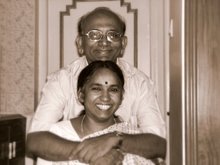Old age does funny things to people. Some people respond
positively to aging and some resist it with gusto. I’ve observed that the
latter pays a hefty price for their behaviour. I can only think of a few of the
costs, though. First, they alienate themselves from their loved ones. The ones
who love them (i.e., often the primary caretakers) experience multitude of
emotions resulting in sub-optimal caretaking behaviours. These caretakers’ –
who are usually the children – memories are reconstructed in what seems to me a
nearly always negative tone, thereby, in some way, reflecting their older relative’s
attitude. Frequently, the aging person will stick to their patterns, regress to
what becomes an old-fashioned or traditional ideology, and resist attempts to
correction and even genuine introspection. Consequently, this leads to a
double-pronged, cyclical troubled (and troubling!) dance wherein the caretakers
will insist on change which is basically an extension of wanting this older
person to understand, accept and adhere to their point-of-view that is met with
the older person lashing out in whatever way suits the situation and their
ability at the time (e.g., name-calling, stubbornness, argumentativeness,
silence, manipulation). Most painfully, in India, I see that the grandchildren
involve themselves in this tussle. I believe that grandchildren, no matter how
old they are in age themselves, do not have the experience, knowledge,
connection or maturity to deal with this difficult situation. However, the
grandchildren will weigh in. These opinions are often in favour of the
caretaker (i.e., their parents), thereby stoking the fire and increasing the
gap between their grandparent and their own parents.
This brings me to the second price that these aging people
pay: they are left with not only their own feelings of resentment but also that
of their children and their grandchildren. In other, less eloquent words, they
feel like shit and people around them feel like shit as well. Now, that’s a
very sad outcome of resisting the unavoidable reality of aging because not only
are they on the losing end of the bargain but also they are breeding negativity
in the third generation. I believe that the grandchildren (and for that matter
the children) will not be able to make peace with themselves should something
untoward happen to the grandparent. I was wrecked with guilt and regret for
having a sour relationship with my maternal grandfather just a few weeks before
he passed away suddenly (he was in no need of caretaking at the time though).
It haunts you. It tears you apart. And I swore to myself I will not behave in
that despicable manner with my 3 remaining grandparents. In my books, I strived
and succeeded. Sure, I yelled and said mean things. But by the time I reached
my home or the end of the day and thought about it, I knew I did something
wrong and always made amendments. When you have difficult grandparents (trust
me, none of the remaining grandparents were/are easy!), you have only two
choices. You can either support your parents in a constructive way or you can
step away from the situation. But I’m a psychologist, fairly introspective,
have a wise husband who is also my mentor, and, importantly, I fear the feeling
of guilt, so I try my best to self-regulate with grandparents. Not everyone can
do that when they are frequently put in a situation that requires you to
engage. Unfortunately, grandparents indirectly or directly force the hand of
their children and grandchildren into behaving in this rude way which will
result in them feeling guilt, regret, sadness, anguish and depression when
their (grand)parent is long gone.
Reflecting this, a third price that old people who resist
aging is they miss out on love during their twilight years. There is just so
much friction when older people cannot adjust, however justified, that there is
no space and time to create love. The giving and receiving of love is the best
part of growing old. People who gracefully age tend to be in the center of so
much love and affection, even if they were horrible people when they were
young. Their counterparts, those who fight the natural course of aging, may
have been wonderful, helpful, and supportive in their younger years. These
positive contributions to their caretakers lives are quickly forgotten when
they stick onto what is considered by the current times archaic ways of life. It
is difficult for the people around them to understand and accommodate a degenerating
brain, neurons that shut down and reject opportunities to ignite new pathways, a
mind that is so set in its loops. It is difficult for them to overcome what
their ward’s willfulness and forgive them their age. And in the end of this
entire struggle, all love is lost.




